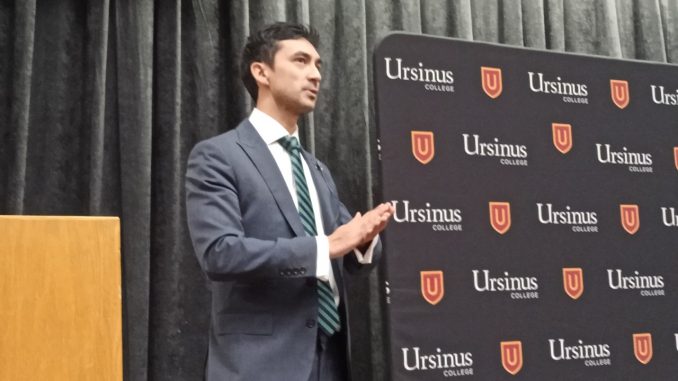
Madison Rodak
marodak@ursinus.edu
On Oct. 6, The Parlee Center for Science and the Common Good welcomed Dr. Geoffrey Supran, a Research Associate in the Department of History of Science at Harvard University, to campus. Supran presented a talk called, “Climate Cover-up: How Big Oil Duped America,” about the politics of global warming. Supran specifically focused on a project he took on with Harvard colleague Naomi Oreskes, studying climate denial.
In the introduction, the Parlee Center noted that Supran’s work and activism has been featured in many major news outlets. “[Supran] is also a frequent contributor to international media, such as PBS News Hour, the New York Times, the LA Times, the Financial Times, and the Guardian,” the Parlee Center said.
In his discussion of change, Supran honed in on how big oil companies, such as Exxon Mobil, have contributed to climate change doubt. “I basically would like to talk to you today about a story which I call climate cover-up,” Supran stated in his opening remarks. “And it’s basically a story of how Big Oil has duped America on climate change and in fact continues to do so. And this is a story essentially based on thousands of pages of documents and evidence compiled by investigative journalists and academic researchers.”
In Supran’s academic project, which was to read all of Exxon Mobil’s documents and produce a peer-reviewed content analysis, Supran and colleague Oreskes were able to put the documents into four categories: internal documents, peer-reviewed, non-peer-reviewed, and advertorials. From these documents, Supran and Oreskes were able to find out a lot of information regarding Exxon Mobil’s strategy with regard to climate science. “Exxon Mobil misled non-scientific audiences about climate change and its implications,” Supran said. “What we found was that roughly 80% of that peer-reviewed science acknowledged basic climate science, and yet, at the same time . . . advertorials promoted doubt on exactly the same matter. So essentially, in other words, [Exxon Mobil] contributed quietly to the science, but loudly to promoting doubt about that same science.”
As Supran worked in the lab each day, he said that he came to a startling realization that “we already have the technologies we need to start taking on the climate crisis. What we lack is the political will.” Supran said that as a way to spread the word about climate change, action has begun to pop up everywhere. He also emphasized that over the past year, it has really been young people who have taken action, citing 16-year-old Swedish activist Greta Thunberg.
In the closing Q&A, Supran explained that people can fight climate denial by using communication tactics surrounding the issue of climate change and find a way to break down climate arguments; Supran suggests speaking in value terms, and offers as an example talking to people about how climate change is the largest national security threat. Supran says that it is also important to “reframe the whole thing and talk about what actions we can take.”
